牛津译林版英语必修二Unit1Grammarandusage1教案
- 格式:doc
- 大小:145.97 KB
- 文档页数:5
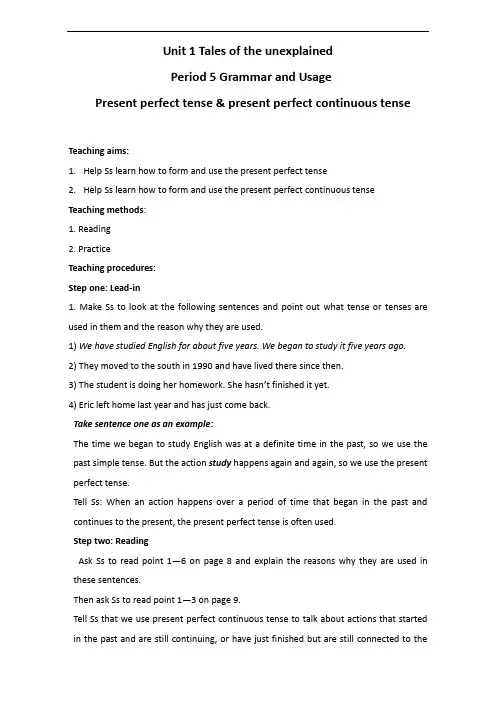
Unit 1 Tales of the unexplainedPeriod 5 Grammar and UsagePresent perfect tense & present perfect continuous tenseTeaching aims:1.Help Ss learn how to form and use the present perfect tense2.Help Ss learn how to form and use the present perfect continuous tenseTeaching methods:1. Reading2. PracticeTeaching procedures:Step one: Lead-in1. Make Ss to look at the following sentences and point out what tense or tenses are used in them and the reason why they are used.1) We have studied English for about five years. We began to study it five years ago.2) They moved to the south in 1990 and have lived there since then.3) The student is doing her homework. She hasn’t finished it yet.4) Eric left home last year and has just come back.Take sentence one as an example:The time we began to study English was at a definite time in the past, so we use the past simple tense. But the action study happens again and again, so we use the present perfect tense.Tell Ss: When an action happens over a period of time that began in the past and continues to the present, the present perfect tense is often used.Step two: ReadingAsk Ss to read point 1—6 on page 8 and explain the reasons why they are used in these sentences.Then ask Ss to read point 1—3 on page 9.Tell Ss that we use present perfect continuous tense to talk about actions that started in the past and are still continuing, or have just finished but are still connected to thepresent in some way.Examples: I’ve been waiting for an hour and he still has n’t turned up.I’m so sorry I am late. Have you been waiting long?Step three: Difference between Present perfect or present perfect continuous Ask Ss to read point 1-4 on page 10 and know the difference between them. Step four: Practicea)Ask Ss to finish doing part A & B on page 11.b)Ask Ss to finish Part C on page 88.。
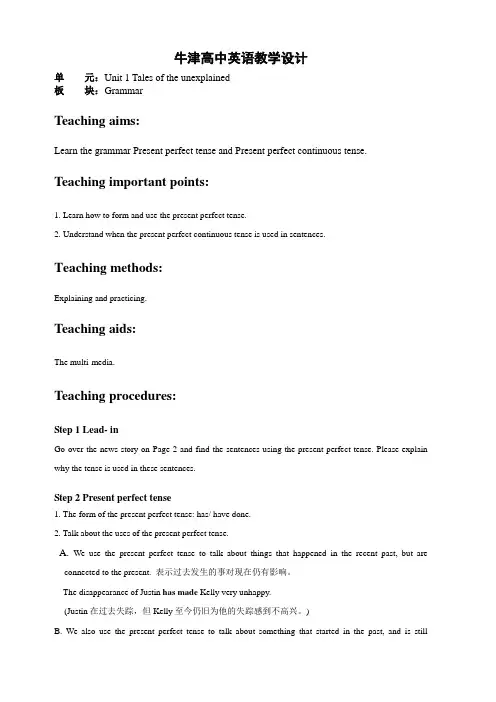
牛津高中英语教学设计单元:Unit 1 Tales of the unexplained板块:GrammarTeaching aims:Learn the grammar Present perfect tense and Present perfect continuous tense. Teaching important points:1. Learn how to form and use the present perfect tense.2. Understand when the present perfect continuous tense is used in sentences.Teaching methods:Explaining and practicing.Teaching aids:The multi-media.Teaching procedures:Step 1Lead- inGo over the news story on Page 2 and find the sentences using the present perfect tense. Please explain why the tense is used in these sentences.Step 2 Present perfect tense1. The form of the present perfect tense: has/ have done.2. Talk about the uses of the present perfect tense.A. We use the present perfect tense to talk about things that happened in the recent past, but areconnected to the present. 表示过去发生的事对现在仍有影响。
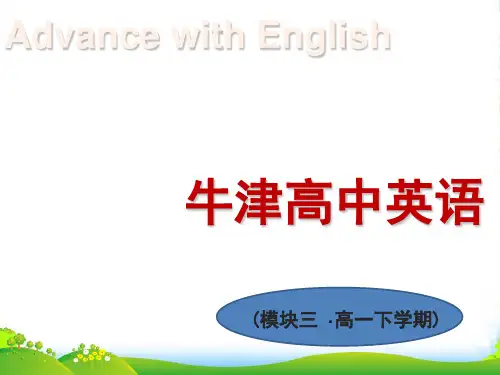
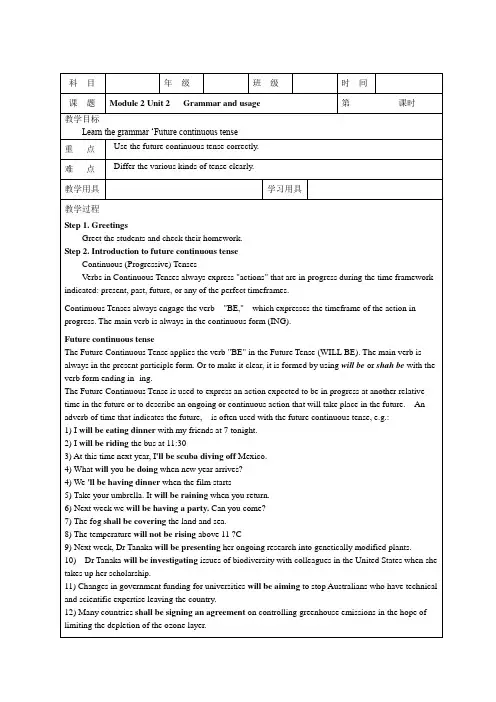

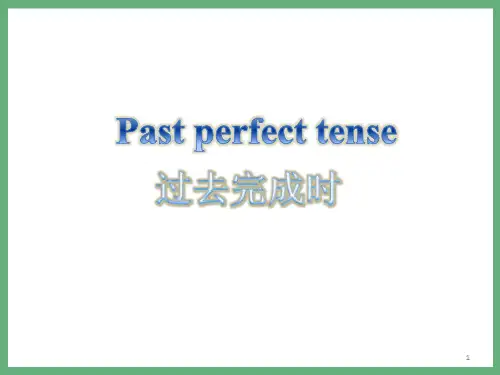
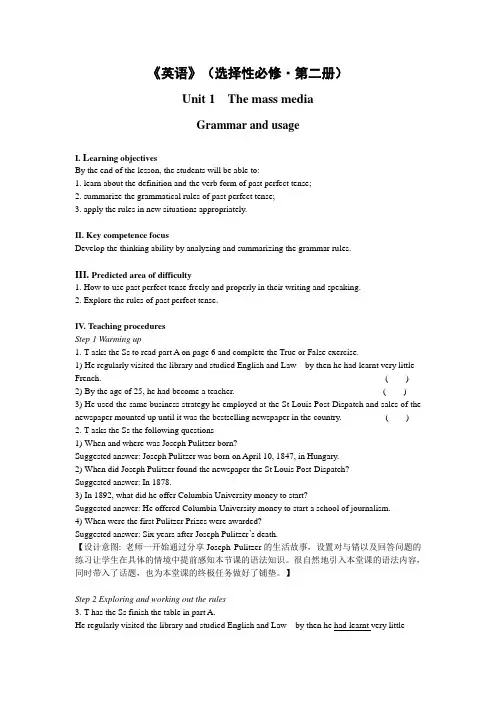
《英语》(选择性必修·第二册)Unit 1 The mass mediaGrammar and usageI. L earning objectivesBy the end of the lesson, the students will be able to:1. learn about the definition and the verb form of past perfect tense;2. summarize the grammatical rules of past perfect tense;3. apply the rules in new situations appropriately.II. Key competence focusDevelop the thinking ability by analyzing and summarizing the grammar rules.III. Predicted area of difficulty1. How to use past perfect tense freely and properly in their writing and speaking.2. Explore the rules of past perfect tense.IV. Teaching proceduresStep 1 Warming up1.T asks the Ss to read part A on page 6 and complete the True or False exercise.1)He regularly visited the library and studied English and Law---by then he had learnt very little French. ( )2)By the age of 25, he had become a teacher. ( )3)He used the same business strategy he employed at the St Louis Post-Dispatch and sales of the newspaper mounted up until it was the bestselling newspaper in the country. ( ) 2.T asks the Ss the following questions1)When and where was Joseph Pulitzer born?Suggested answer: Joseph Pulitzer was born on April 10, 1847, in Hungary.2)When did Joseph Pulitzer found the newspaper the St Louis Post-Dispatch?Suggested answer: In 1878.3)In 1892, what did he offer Columbia University money to start?Suggested answer: He offered Columbia University money to start a school of journalism.4)When were the first Pulitzer Prizes were awarded?Suggested answer: Six years after Joseph Pulitzer’s death.【设计意图: 老师一开始通过分享Joseph Pulitzer的生活故事,设置对与错以及回答问题的练习让学生在具体的情境中提前感知本节课的语法知识。
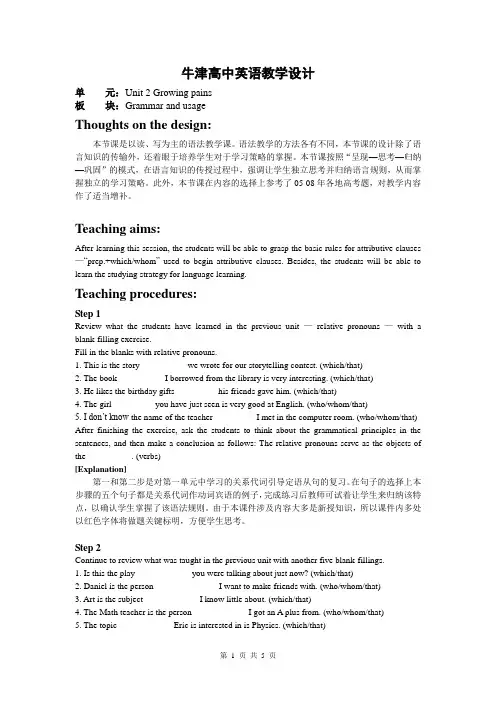
牛津高中英语教学设计单元:Unit 2 Growing pains板块:Grammar and usageThoughts on the design:本节课是以读、写为主的语法教学课。
语法教学的方法各有不同,本节课的设计除了语言知识的传输外,还着眼于培养学生对于学习策略的掌握。
本节课按照“呈现—思考—归纳—巩固”的模式,在语言知识的传授过程中,强调让学生独立思考并归纳语言规则,从而掌握独立的学习策略。
此外,本节课在内容的选择上参考了05-08年各地高考题,对教学内容作了适当增补。
Teaching aims:After learning this session, the students will be able to grasp the basic rules for attributive clauses —“prep.+which/whom”used to begin attributive clauses. Besides, the students will be able to learn the studying strategy for language learning.Teaching procedures:Step 1Review what the students have learned in the previous unit —relative pronouns —with a blank-filling exercise.Fill in the blanks with relative pronouns.1. This is the story __________ we wrote for our storytelling contest. (which/that)2. The book __________ I borrowed from the library is very interesting. (which/that)3. He likes the birthday gifts _________ his friends gave him. (which/that)4. The girl _________ you have just seen is very good at English. (who/whom/that)5. I don’t know the name of the teacher _________ I met in the computer room. (who/whom/that) After finishing the exercise, ask the students to think about the grammatical principles in the sentences, and then make a conclusion as follows: The relative pronouns serve as the objects of the __________. (verbs)[Explanation]第一和第二步是对第一单元中学习的关系代词引导定语从句的复习。
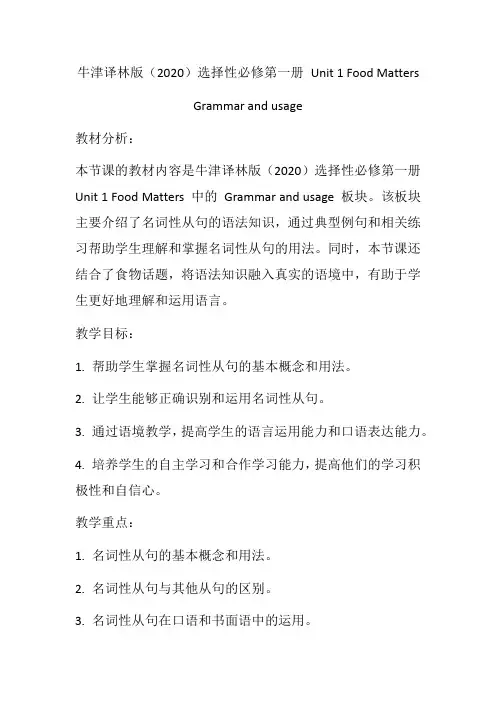
牛津译林版(2020)选择性必修第一册Unit 1 Food MattersGrammar and usage教材分析:本节课的教材内容是牛津译林版(2020)选择性必修第一册Unit 1 Food Matters 中的Grammar and usage 板块。
该板块主要介绍了名词性从句的语法知识,通过典型例句和相关练习帮助学生理解和掌握名词性从句的用法。
同时,本节课还结合了食物话题,将语法知识融入真实的语境中,有助于学生更好地理解和运用语言。
教学目标:1. 帮助学生掌握名词性从句的基本概念和用法。
2. 让学生能够正确识别和运用名词性从句。
3. 通过语境教学,提高学生的语言运用能力和口语表达能力。
4. 培养学生的自主学习和合作学习能力,提高他们的学习积极性和自信心。
教学重点:1. 名词性从句的基本概念和用法。
2. 名词性从句与其他从句的区别。
3. 名词性从句在口语和书面语中的运用。
教学难点:1. 名词性从句中连词的选择和使用。
2. 名词性从句与主句的逻辑关系和语序问题。
3. 名词性从句在不同语境下的运用。
学情分析:本节课的教学对象是高一学生,他们已经具备了一定的英语基础和语法知识,但对于名词性从句这一较为复杂的语法点可能还存在一定的困惑和疑问。
因此,在教学过程中,教师应该注重由浅入深、由易到难地讲解,通过实例和练习帮助学生逐步掌握名词性从句的用法。
此外,教师还应该关注学生的个体差异,针对不同层次的学生进行有针对性的指导。
教学策略:1. 激活学生的前知:通过提问和回顾之前所学的语法知识,激活学生对于名词性从句的前知。
2. 教学策略:采用讲解、示范、小组讨论和实例分析相结合的方式进行教学。
在教学过程中,注重引导学生主动参与,鼓励他们积极思考和发现规律。
同时,教师还应该根据学生的实际情况进行有针对性的指导和点拨。
3. 学生活动:组织学生进行小组讨论和实例分析活动,让他们在实践中学习和掌握名词性从句的用法。
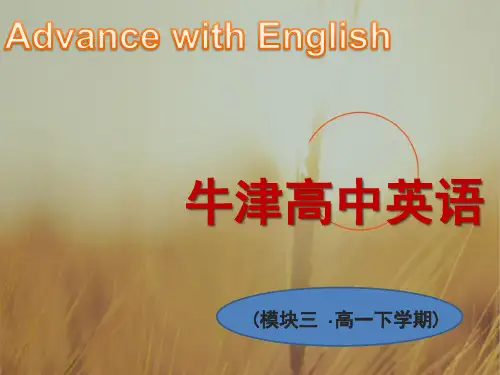
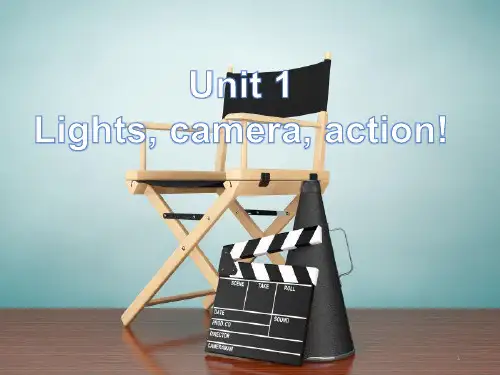
Tales of the UnexplainedGrammar and Usageby Jia Liyi课堂设计指导思想:本节课是一节语法课。
基于任务型教学法的理念,在设定的情境中培养学生运用语言解决问题的能力。
本节课将语法学习与学生的生活实际联系起来,激发学生学习兴趣,重视学生的体验与参与。
基于语法课的特点,本节课借助多媒体开展教学活动,围绕核心语法项目——现在完成进行时和现在完成时设定任务,通过图片展示、名言警句欣赏、角色扮演等方式,让学生在小组合作和讨论中完成任务,实现预设的教学目标。
Teaching aims:1.Learn the form and usage of the present perfect continuous tense and review the presentperfect tense.2.Learn to know when the present perfect tense and the present perfect continuous tense is usedin sentences through context.3.Learn to cooperate with classmates during activities.4.Develop thinking habit of discovering and analyzing.Important and difficult points:1. Compare the differences between the present perfect continuous tense and the present perfect tense.2. Learn to distinguish different usages between the two tenses.3. Learn how to use the two senses to describe things and express opinions and attitudes.Teaching methods:Students-centered method; Communicative method; Task-based methodTeaching aids: Multimedia facilities; BlackboardTeaching procedures:Step 1 Lead-in1.Show a picture of a famous movie Music and Lyrics and play the song Way Back into Love. Before that, ask Ss to appreciate the repeated lyrics:I have been living with a shadow overheadI have been sleeping with a cloud above my bedI have been lonely for so long trapped in the pastI just can't seem to move onI have been hiding all my hopes and dreams awayJust in case I ever need them again somedayI've been setting aside timeTo clear a little space in the corners of my mindAll I want to do is find a way back into love......I've been watching but the stars refuse to shineI've been searching but I just don't see the signsI know that it's out thereThere's got to be something for my soul somewhereI've been looking for someone to shed some light……2. Ask Ss a question Have you found any similar patterns in this song? after playing the song.【设计意图】以歌曲激发学生的学习兴趣,听歌的同时引入主题,引导学生自主发现本课将要重点讲解的内容,以及语法结构have been doing。
●Grammar and UsagePresent perfect tense1. Use different methods to present the present perfect tense. Here are some ideas:1) Please look at the screen. Pay attention to the different forms of the verbs:2) Let’s complete the following sentences, in which the predicate part is missing.We_____(study) English for about five years.They_____(live) in the south since their daughter was born.I_______ (read) your article three times. It's well written.The student________(finish) her homework already.Eric__________(go) back to his hometown today.Answers: have studied have lived have read has finished has gone3) Read the following sentences and point out what tense or tenses are used in them and the reasons why they are used.We have studied English for about five years. We began to study it five years ago.They moved to the south in 1990 and have lived there since then.The student is doing her homework. She hasn't finished it yet.Eric left home last year and has just come back.2. We may wonder why some verbs can't be used in the present perfect tense. Let’s read the following sentences, and try to find different usages of some verbs.Justin has been away from home for several days. He disappeared last Friday.They bought this house three years ago and they have lived here since then.My brother went to see my grandpa last week. He has visited him three times this month.So you see when an action happens over a period of time that began in the past and continues to the present, the present perfect tense is often used. When an action happened at a definite time in the past, the past simple tense is often used.3. Read Points 1 and 2 on page 8 to make sure why the present perfect tense is used in these two sentences.4. Go over Point 3 on page 8 to learn what time expressions can be used with the present perfect tense. Pay attention to the different usages between already and yet, or for and since.5. Read Point 4 on page 8 to learn that the present perfect tense can be used in a situation where the action was completed only a moment ago. In this case, just is used.6. Go over Points 5 and 6 on page 8 and note that when we want to express a repeated action, we use the present perfect tense with the time expressions once/twice/three times ...7. Let’s read the diary entry and then complete it using the correct forms of the verbs in brackets.Answers:(2) saw (3) has visited (4) loves (5) hasn't visited (6) has swum (7) has never met(8) has dived (9) has found (10) hasn't found (11) Has, beenSummary of The Present Perfect tense:1.We use the present perfect tense to talk about things that happened in the recent past, but areconnected to the present.Daniel has lived(live) in Beijing since he came to China.(Connection with the past: Daniel came to China. Connection with the present: Daniel is living in China.)2.We use the present perfect tense to talk about something that started in the past, and is stillhappening now.came has lived________________________________________past now future3.We use the present perfect tense to talk about actions that were completed only a short time ago.I went to Egypt in 1986. I went to Egypt in 2004.I have been (be) to Egypt twice.4.We can also use the present perfect tense for repeated actions.Has it ever snowed(snow) in Hong Kong?No, it has never snowed(snow) there.5.We use the present perfect tense when the exact time of an action is not clear or important. We useit with time expressions such as: already, ever, for, just, lately, never, recently, since, yetNotes:1. We use already for affirmative statements and yet for negative statements and interrogativesentences.2. We use for + a period of time and since + a point of time.3. Structures connected with the present perfect tense:1) It is (has been) +a period of time +since-clause.2) This (That/It) is the first (second…) time + that-clause (present perfect tense).3) This (That/It) is the only ) … + that-clause (present perfect tense).4) This (That/It) is the best/ finest /most interest ing … + that-clausePresent perfect continuous tenseHere we will look at two situations in which the present perfect continuous tense is used. Note how the tense is formed and try to understand how the tense is used in sentences. We will practise forming verbs in this tense and complete sentences.1. We sometimes use the present perfect continuous tense to talk about actions that started in the past and are still continuing, or have just finished but are still connected to the present in some way. For example,I've been waiting for an hour and he still hasn't turned up.I'm so sorry I'm late. Have you been waiting long?2. Go over Points 1 and 2 on page 9 to understand this tense better.3. Go over Point 3 to see how the tense is formed.4. Fill in the missing words. Pay attention to the verb form in the example given in the first picture (all the verb forms here are the present perfect continuous tense, except for the one in Sentence 5). It is a trap and does not require the present perfect continuous tense.Answers:(2) have been talking (3) have been taking (4) have been watching (5) have seen (6) have been writing5. Do with Part C1 on page 82 in Workbook to become familiar with the present perfect tense and the present perfect continuous tense.Present perfect or present perfect continuous?1. Go over Point I on page 10 to identify why the two different tenses are used in the two sentences.In the first sentence, the present perfect tense is used, which means that the action read isn't continuing, and Li Jia knows what the book is about now. In the second sentence, the present perfect continuous tense is used, which means that the action read is still continuing.2. Go over Point 2 on page 10. Note that the present perfect continuous tense can't be used with time expressions such as twice or how many times, because in this tense the action is continuous, not stopped and then started again.3. Go over Point 3 on page 10 to define the meaning of a state verb or an action verb. Note that a state verb doesn't mean an action, so it can't be used in a continuous tense.4. Note that the present perfect continuous tense can't be used when the words always, never, yet, already or ever are used in a sentence.5. Finish the two exercises on page 11.Answers:A (1) heard (2)been doing (3) been researching (4) been doing (5) started (6) done (7) read (8) found (9) started (10) been doing (11) been makingSample answers:B 1. He has been waiting at an underground station.2. They have been traveling in a UFO. It looks like a saucer. (Answers may be various.)3. They probably have talked to animals or plants on the Earth as well as creatures on other planets. (Answers may be various.)4. They have visited Mars, Venus, Jupiter and some other planets. (Answers may be various.)6. Do with Part C2 on page 82 in Workbook to have one more chance to practise the usage of the two different tenses.ConsolidationI. Relative items in recent y ears’ college entrance examinations:1. My friend, who ____ on the International Olympic Committee all his life, is retiring next month.(2006浙江)A. servedB. is servingC. had servedD. has served2. John and I ________friends for eight years. We first got to know each other at a Christmas party. Butwe ________each other a couple of times before that. (2002北京春季招生)A. had been; have seenB. have been; have seenC. had been; had seenD. have been; had seen3. With the rapid growth of population, the city ________in all directions in the past five years. (2003北京春季招生)A. spreadsB. has spreadC. spreadD. had spread4. --How long ________at his job? --Since 1990. (2003北京春季招生)A. were you employedB. have you been employedC. had you been employedD. will you be employed5. How can you possibly miss the news? It ________on TV all day long. (2004 北京春季招生)A. has beenB. had beenC. wasD. will be6. Now that s he is out of a job, Lucy ________going back to school, but she hasn’t decided yet. (2004 北京高考)A. had consideredB. has been consideringC. consideredD. is going to consider 7.--How are you today? (2000全国高考)--Oh, I ________as ill as I do now for a very long time.A. didn’t feelB. wasn’t feelingC. don’t feelD. haven’t felt8. I _______ Ping-pong quite well, but I haven’t had time to play since the new year. (2001全国高考)A. playedB. will playC. have playedD. play9. I wonder why Jenny ________us recently. We should have heard from her by now. (2002全国高考)A. hasn’t writtenB. doesn’t writeC. won’t writeD. hadn’t written10. Although he has lived with us for years, he ________us much impression. (2004上海春季招生)A. hadn’t leftB. didn’t leaveC. doesn’t leaveD. hasn’t left11. The first use of atomic weapons was in 1945, and their power ________increased enormously eversince. (2004上海高考)A. isB. wasC. has beenD. had been12. She has set a new record, that is, the sales of her latest book ________50 million. (2004福建高考)A. have reachedB. has reachedC. are reachingD. had reached13. More patients ________in hospital this year than last year. (2004江苏高考)A. treatedB. have treatedC. had been treatedD. have been treated14. --The window is dirty. --I know. It ________ for weeks. (2004广西高考)A. hasn’t cleanedB. didn’t cleanC. wasn’t cleanedD. hasn’t been cleaned15 Years ago we didn't know this, but recent science ______ that people who don't sleep well soon get ill.(2005广东高考)A. showedB. has shownC. will showD. is showing16. The coffee is wonderful ! It doesn’t taste like anything I _____ before. (2005全国卷I)A.was having B.have C.have ever had D.had ever had17. My brother is an actor. He _________ in several films so far. (2005浙江卷)A.appears B.appeared C.has appeared D.is appearing18. I ____ in London for many years, but I’ve never regretted my final decision to move back toChina. (2006重庆)A. livedB. was livingC. have livedD. had lived19. Although medical science ____ control over several dangerous diseases, what worries us is thatsome of them are returning. (2006江苏)A. achievedB. has achievedC. will achieveD. had achieved20. I won’t tell the student the answer to the math problem until he ____ on it for more than an hour.(2006湖北)A. has been workingB. will have workedC. will have been workingD. had workedII. Translation1 我已经看了说明,但我还是不理解。
牛津高中英语教学设计
单元:Unit 1 Tales of the unexplained
板块:Grammar
Teaching aims:
Learn the grammar Present perfect tense and Present perfect continuous tense. Teaching important points:
1. Learn how to form and use the present perfect tense.
2. Understand when the present perfect continuous tense is used in sentences.
Teaching methods:
Explaining and practicing.
Teaching aids:
The multi-media.
Teaching procedures:
Step 1Lead- in
Go over the news story on Page 2 and find the sentences using the present perfect tense. Please explain why the tense is used in these sentences.
Step 2 Present perfect tense
1. The form of the present perfect tense: has/ have done.
2. Talk about the uses of the present perfect tense.
A. We use the present perfect tense to talk about things that happened in the recent past, but are
connected to the present. 表示过去发生的事对现在仍有影响。
The disappearance of Justin has made Kelly very unhappy.
(Justin在过去失踪,但Kelly至今仍旧为他的失踪感到不高兴。
)
B. We also use the present perfect tense to talk about something that started in the past, and is still
happening now.表示过去开始的动作一直延续到现在。
I have not seen Justin since last Friday night.(从上周五晚上到现在一直都没有见到过。
)
C. We use the present perfect tense when the exact time of an action is not clear or important. We use it with time expressions such as:
already ever for just lately never recently since yet
Exercise: Complete the following sentences with the proper tense.
(1) We have studied (study) English for about five years.
(2) They have lived (live) in the south since their daughter was born.
(3) I have read (read) your article three times. It’s well written.
(4) The student has finished (finish) her homework already.
(5) Eric has just gone (go) back to his hometown.
We use already for affirmative statements and yet for negative statements.
We use for + a period of time and since + a point in time.
D. We use the present perfect tense to talk about actions that were completed only a short time ago. In this case, just is used. Pay attention to the position of just.
The police have just finished searching the area.
E. We can also use the present perfect tense for repeated actions, that is, we use the present perfect tense with the time expressions once/twice/three times…
3. Read the diary entry and then complete it using the correct forms of the verbs in brackets. Answers: (1) saw (2) has visited (3) loves (4) hasn’t visited (5) has swum (6) has never met (7) has dived (8) has found (9) hasn’t found (10) Has, been
Step 3 Present perfect continuous tense
1. The form of the present perfect continuous tense: have / has been doing
2. Talk about the uses of the present perfect continuous tense
A. We sometimes use the Present perfect continuous tense to talk about actions that started in the past and are still continuing. 表示过去开始的动作一直延续到现在并仍在继续之中。
I have not been sleeping well since I returned home.
“我”回家后一直都没有睡好,现在也没有睡好。
B. We also use the present perfect continuous tense to talk about actions that have just finished but are still connected to the present in some way. 表示过去开始的动作刚结束并在某种情况下与现在有关联。
Kelly:Sorry I'm late.Have you been waiting long?
Sally:Yes.I have been waiting for an hour.
凯利刚到,对方虽然不再等了,但已一直等到现在。
3. Fill in the missing words on page 9
Answers: (1) have been talking (2) have been taking (3) have been watching
(4) have seen (5) have been writing
Step 4 Homework
1. Prepare Grammar and usage on page 10-11.
2. Finish Part C1 and C2 on page 88 in Workbook.。